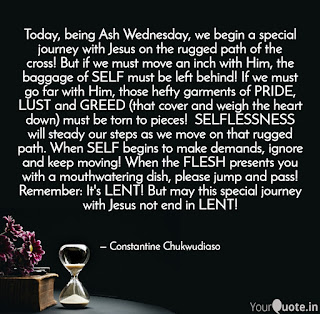The Call to Perfection and the Mission of Love (Saturday, Lent 1)

Helmsmen (i.e. those who steer heavy vessels on the sea) will be in a better position to tell us the state of a ship that is disconnected from its rudder (a rudder is an underwater vane that controls the movement of the ship). That ship will continue to wander aimlessly at the middle of the sea, neither moving forward nor backward. So it is in our spiritual life: if we are disconnected from our main mission on earth (the mission of love), then we will run the risk of becoming stunted in our spiritual growth. Deuteronomy 26:16-19 is so emphatic about keeping the commandments of the Lord. And what are these commandments? Jesus tells us that they are only two: LOVE OF GOD AND TO LOVE OF NEIGHBOUR (cf Mk. 12:20-31). On this, St John says that “whoever claims to love God yet hates a brother or sister is a liar” (1 Jn. 4:20). In order words, there is only one commandment: TO LOVE OUR NEIGHBOUR WITH OUR WHOLE HEART. In the responsorial psalm, the psalmist says that “blessed are those who walk...





















